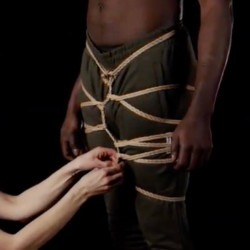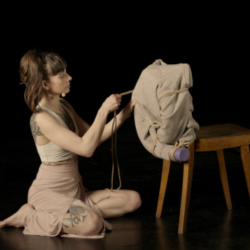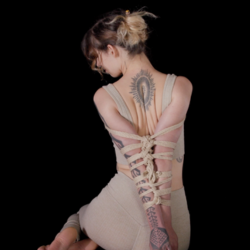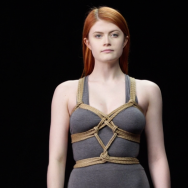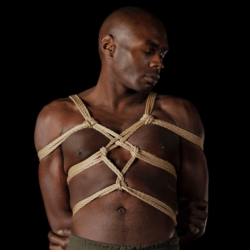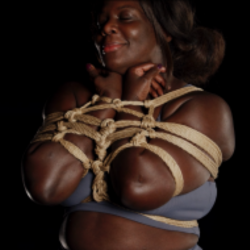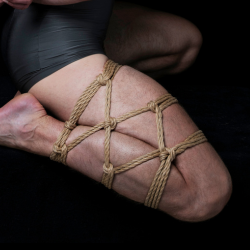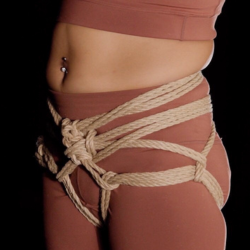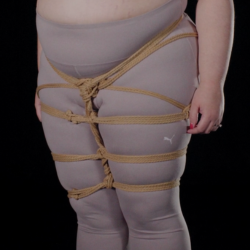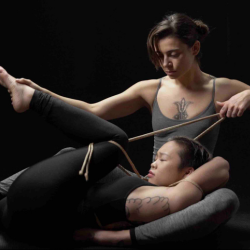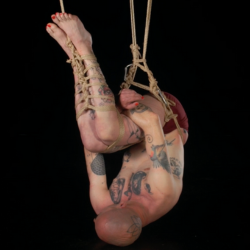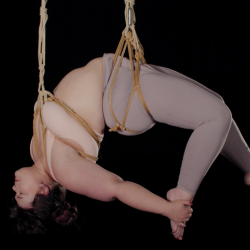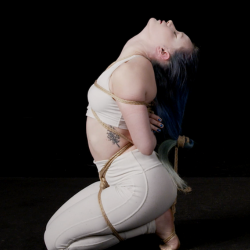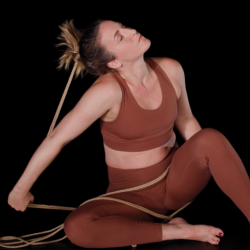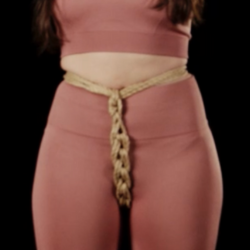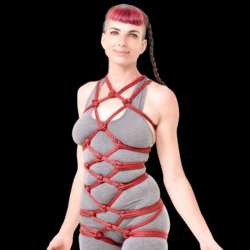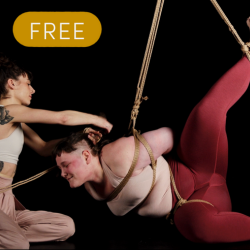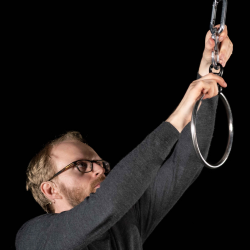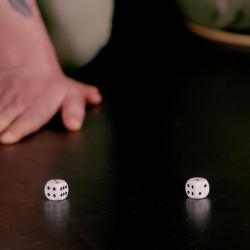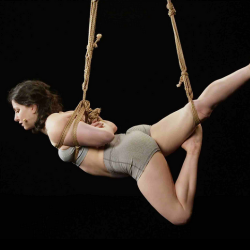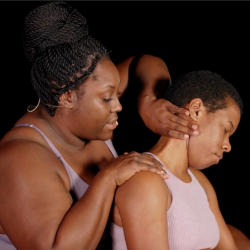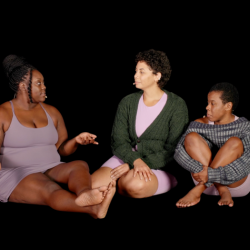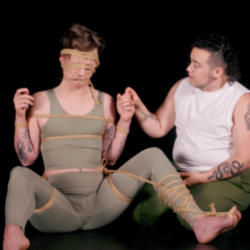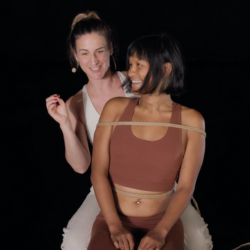EP 46
RED LILY
Let’s learn the rules, then create ties. Beatrice shares her journey from shibari educator to relationship coach, exploring how to navigate relationship dynamics, challenge traditional roles, and harness the transformative power of open communication in kink and beyond.

Red Lily (she/her) is an Italian queer feminist, intimacy and relational coach based in Copenhagen. As norm critical educator, with 15 years of experiences of performing and teaching shibari and kink, she’s creating safe(r) spaces for exploration of ropes and its power and shaping experiences with re-creative approach.
Instagram: @redlily_dk
[00:00:08] Wicked Wren Hello to all my guys, gals and non-binary pals. Welcome to the Shibari Study podcast. I'm your host, Wren. Shibari Study is an online learning resource offering video tutorials for beginners or advanced practitioners. Whether you're brand new to the world of shibari and needing to learn the basics, or a seasoned rigger or rope bottom seeking inspiration to push your practice to new places, there's something for you at shibaristudy.com. Today I'm talking to Beatrice. You'll know Beatrice as Red Lily on Instagram. Beatrice uses she/her pronouns, is a shibari educator and performer. We're going to talk about how she uses that ten years of experience and brings it into relationship coaching. Hello Beatrice, how are you?
[00:00:53] Beatrice Hi. Hello. I'm very good. What about you?
[00:00:55] Wicked Wren I am doing wonderful. So before we started recording, you were telling me that you're really into ugly dogs?
[00:01:08] Beatrice Yeah. My real (…). I'm an hardcore ugly dog lover.
[00:01:14] Wicked Wren Do you think that it's because those dogs don't get as much love?
[00:01:21] Beatrice Yeah, I think this is connected with my idea of inclusivity in a way, you know, because nobody wants them and I like them a lot. So why they don't like them? You know? Why they don't like them?
[00:01:33] Wicked Wren You're right. And I actually think that this is going to be really next to our conversation about traditional relationships versus new relationships and the patriarchy and white supremacy and all these kinds of things. I think it's probably beauty standards that no one can live up to. I'm sure that –
[00:01:52] Beatrice I have a good relationship with ugly dogs. I have to say.
[00:01:55] Wicked Wren I love that. I think it says a lot about you. And your heart. We were talking and you were saying that relationship coaching is a rather new thing that you're doing and exploring, and you found rope and shibari before that. So can you talk to us a little bit about how you found (…)? What was your intro into (…) rope?
[00:02:22] Beatrice Yeah, I started like 15 years ago. More or less, I went to see a performance that wasn't a shibari performance, but just before there was a shibari performance and I said, Okay, that's cool, I will never do that. But like that's cool. Uh, I was wrong!
[00:02:36] Wicked Wren Why did you say that? Why did you say you wouldn't do it?
[00:02:42] Beatrice I don't know, I think because the person that was tying was like a big, man tying a very tiny, cute young girl. And they didn't feel.. That I was as she was. And I couldn't imagine that I could be on the other side.
[00:03:02] Wicked Wren A tale as old as time.
[00:03:05] Beatrice I think it's like a very common story, you know?
[00:03:08] Wicked Wren Yes, yes, yes. So that's fascinating. So you saw that and you're like, That isn't for me. And then time went on.
[00:03:17] Beatrice Yeah. And then I started. I tried to get tied. I didn't like it a lot. I wasn't – I think that the energy of the person that was tying me wasn't like the energy that I liked, but I didn't know that. So, what was offered to me was like, Or you like it, or you simply don't like shibari at all. This is not something for you. Then I started tying and I discovered that that was my thing. So I started tying frequently and a lot and with a lot of fun.
[00:03:48] Wicked Wren Something that's cool about your origin story is it sounds like you were almost shown the quote unquote, right ways that something should happen. You saw a big guy tying a small woman, and then you were tied by someone in the way that that top thought you should have been tied in, and you didn't like it. What was the journey to find authentic ways to interact with rope?
[00:04:15] Beatrice It took it took quite a while to me to, to enjoy tying. Enjoying tying was pretty simple to me. I simply liked it. And I started to, to tie in a way that, that was the one that someone teached me. Taught me. But then I started also to get tied again. To get tied again. And that started when I discovered that all the boundaries that the person told me, told me, like, about my aesthetic, my body weight, my way to react... Weren't real. This person told me that people over 70 kilos can't be suspended. So I thought that that was my thing that I, you know, and I didn't like it and I wasn't reacting as he wanted, you know, then I discovered that there was so many ways. But I discover it because I was dead in love with shibari that I started traveling. And traveling, I met a lot of people living different shibari experience with different lives, and discovering also that there were other women or people that consider themselves women, tying. And in Italy, I was like the one and only, you know, for a while.
[00:05:39] Wicked Wren Have you seen that scene change over the years? Has it gotten better?
[00:05:44] Beatrice Luckily, yes. The scene changed completely. I can say that everything that we can see now is like... It was, like, not even possible to imagine ten years ago. For, for a couple of years, like around ten years ago, a lot of people, queer people, female or let's say non cis men person started tying. Started to explore switching, both sides or tying. When I went to my first party, I was the first one switching in a public space in Rome. That was like crazy to me. Nobody was switching. That was impossible, you know? And now that everything changes, because we are more ready to explore everything life offers us.
[00:06:35] Wicked Wren Absolutely. Had you always been (…)?
[00:06:39] Beatrice No, I was like, I, I thought I was completely vanilla just before discovering shibari. I was, like very, very traditional in my relationships and in my sexuality. I considered myself, I consider myself very young. I wasn't that young, you know, but it was like... I felt young in my experiences, you know. I didn't have almost any connected with experimentation or different relationships or whatever.
[00:07:13] Wicked Wren That's a really good thought. Is that even if the numbers weren't super, super young, it's still young in the experience and it's approaching something not knowing.
[00:07:26] Beatrice But also my background is a bit special because I was born in Sicily, you know, the real south of Italy. So, then I left when I was 19, but from 0 to 19, I didn't have almost any experience because that was like the, the, the city was too traditional for that. I couldn't even imagine, you know.
[00:07:50] Wicked Wren Do you have family in Sicily still?
[00:07:52] Beatrice Yes. My old family is there.
[00:07:54] Wicked Wren Do they know that you're (…)?
[00:07:56] Beatrice They know everything about me.
[00:07:58] Wicked Wren How do they feel?
[00:08:00] Beatrice They feel very good. My brother and my sister are coming to my performances, performances when I go to Sicily to perform or teach. Because there is a school in Sicily now that I'm helping to create. So when I go there, I teach for the students, but also for the teachers. And so my brother and my sister joined. My mother didn't, because she feels too old [00:08:22]and not free because she'd judge me. [1.4s] But my mom is 76, 76 years old, so it's like...
[00:08:31] Wicked Wren She might be a little too old.
[00:08:33] Beatrice You know?
[00:08:35] Wicked Wren I feel like mom can stay at home. You can just show her some videos.
[00:08:39] Beatrice But my dad is painting because he loves to paint. And is painting one of the picture of one of my performances.
[00:08:47] Wicked Wren That's amazing.
[00:08:47] Beatrice Yeah, they probably think – so, if my parents understood it, anybody can.
[00:08:53] Wicked Wren Were you afraid when you came out to them as (…)?
[00:08:59] Beatrice Hmhm. A bit. For sure, I was a bit scared but what I tried to do was to communicate with them how they could understand. So with my my, my dad, I tried to communicate in an artistic, aesthetic way. With my mom, it was more... I'm doing a cool thing. And for for her, that is more interested in cool people and bit, and people like in television. It was cool for her that I was writing a book or, like, going on television or, doing podcasts or whatever.
[00:09:41] Wicked Wren Can you tell us about the book you wrote?
[00:09:44] Beatrice When it started, like at the very beginning, I think six months after I started, I was, I was together with this person that introduced me to shibari, and he wanted to write a book, and I was a translator, and I was working with, with an editor. And then we we wrote it. I wrote it. Like he had the competences, I had the writing skills, and I wrote it with my name, with my full name. So if you look for my name, if you look Beatrice shibari, you will find it.
[00:10:17] Wicked Wren What was that experience like? Did you learn things that you didn't know that you would learn? Were there any things that surprised you from writing a book? I think a lot of people want to share their knowledge and write a book, or put classes up those kinds of things. Is there anything that surprised you about doing that?
[00:10:36] Beatrice Everything. That was a full journey for me, especially doing classes and educating and teaching. I learned more from my students than from all the teachers that I met. I also learned how to tie. More from my students than from everybody else.
[00:10:52] Wicked Wren What do you mean by you learned how to tie from that?
[00:10:56] Beatrice Because I had to understand it. Instead of remember it, there was something... At one point I started to try to make videos of my fingers tying because I wasn't able to tell them what I was doing and why the specific thing or friction or whatever was working for me and not for them. So I started to like, really look at my hands doing something in the very detail because it was okay. So my pinky is in this position in there. You know, my hands are doing that. So to learn all the technical part, how to remove all the memory from the shibari and all the understanding, the technique is something that I did for my students mostly.
[00:11:42] Wicked Wren Were there a lot of things that you were doing that were maybe extra or you didn't need to do that you eliminated when you actually went in and audited what your hands were doing or where your rope was moving and stuff like that. Did that really affect the way that you tied after that?
[00:12:00] Beatrice Yeah, it affected it a lot. I can say that before I had so many steps in each tie, and now I'm like, I need less steps for that.
[00:12:12] Wicked Wren Why do you think that people overengineer things. Because I hear this a lot. When people start, they have TKs that take 87 ropes and there's a billion frictions in it, and it's so overengineered. And then as you tie for longer, it becomes simpler and simpler and simpler. Do you think there's a bigger thought there?
[00:12:37] Beatrice I don't know, but I think that there is something about the style, this baroque vibe that there was at one point with a lot of frictions and knots and everything. And, I think that some people thought that it was cool and now it's cool the complete opposite. You know, it was like the big fun ten years ago. And now everything has to be very small and then again big. You know, they think like, this is like, to me, it's like that.
[00:13:06] Wicked Wren Yeah. Everything does ebb and flow like that.
[00:13:08] Beatrice You know. But also shibari, this year we use this like, this friction, is like the season of the pink, you know. This season we all want to wear pink. And the other one we want, all want to wear purple.
[00:13:23] Wicked Wren Yeah. I would be so curious in how those micro trends happen.
[00:13:31] Beatrice For sure, there are some very famous riggers that are showing it a lot, and they have a lot of students that are sharing almost the same ties in the same weeks. So you can see that there are some schools and styles where in the same week everybody's tying the same tie and it's... And that's starts a trend and everybody want to tie that.
[00:13:52] Wicked Wren How did you learn in the beginning?
[00:13:54] Beatrice I learned with that person. That was so bad. Also learning or also, teaching it was very bad, the teaching, and with not not enough competences. And then I started traveling. And I discovered so many things because I wasn't... Very teach. I started to organize events for everybody a lot in Rome. So I was able to invite other students, pay educators and have some free classes. So, I started to learn from, like, almost everybody at the time and then continuing to do that.
[00:14:29] Wicked Wren What an amazing way.
[00:14:31] Beatrice Yeah. And it's like, it was very, very helpful to me and amazing because I discovered so many different ways to explore that. And so I was able to find my ways because I don't have only one, I think.
[00:14:46] Wicked Wren That's so cool. You do seem like a person that approaches a problem from many different directions and angles.
[00:14:53] Beatrice Yeah, but also like to... I like to solve problems, you know, I like to connect with the person that I have with me. I don't, I'm, that's, it's not important at all to me the technical part, if it's not connected to safety. If I don't have to do a performance or like a picture, you know, if it's for picture, for sure. There is the aesthetic part that is very important to me. But everything else has to be like how this create connection with the person I'm tying with, how this tie is representing that person. The style is not important.
[00:15:28] Wicked Wren How do you approach something that daunting? Thinking about how I can tie this person in an authentic way and make them feel seen for who they are. How do you approach something like that?
[00:15:42] Beatrice With a huge conversation before. I can't, I don't think I'm that smart to be able to understand the real person that is in front of me. Especially if it's a person that I don't know very well. But sometimes people, and that happens to me frequently, maybe because people consider me as a queer person that ties mostly queer person, queer people and, they, they tell me something like, I don't want to be seen as that feminine. I know that I'm a female figuring person. But I don't want to look like this shy, cute, fragile person suspended, you know? And how can we create it? Can we change it? Can we change the image of your body through ropes? Yeah, we can, we can, we can change the focus of the tie and the way we connect with the person. And they can, we can tie a person making them very strong instead of cute, fragile.
[00:16:46] Wicked Wren I really love what you said. You're not going to be able to understand the real person in front of you all the time. We all have masks that we put on, and as we become more familiar with someone, those masks come off and new masks get put on. I suppose that I would love to have a conversation around that and how the layers of people come off.
[00:17:11] Beatrice Yeah, and a lot of people are really going, want to really go all in on both sides I mean. Especially tops thinks that they are seeing the real self of the other person. But nobody's doing that. Nobody's doing that. It takes time, a lot of time and discovery and exploration and being open to everything else. All the information that you receive from the person, literally what this person is saying to you, but also what this person is exploring. And now this person is expressing it to try to go as close as possible to the real self. I don't think that we can explore our real self in this way if not with ourself.
[00:17:57] Wicked Wren Yeah, you talked about this starts with a conversation, and I would love to hear some ways that we can have these conversations. How do you approach these in the very beginning? What are some tactile things that you use to open up a dialog?
[00:18:17] Beatrice I'm very direct and so I probablyy open the conversation. I start from the body. Every time I have to talk about tying together, I start from the body because it's more simple for the people. Talk about, Okay, my shoulder is not good and my left knee is, you know, and then I slowly, slowly go to expectations. But also, Why do you want to get tied by me? Because this saves a lot of time. Because some people answer to me, Because I want to get tied by a female. Because females are so soft. And then I'm like, Maybe I'm the wrong female. I'm not that soft, you know. And this says a lot about them. But also then I ask them, can you show me a picture of something that you want to be. And sometimes you feel that they show you something about shibari, but sometimes they show you something completely different. Someone dancing or someone flying or whatever. Or someone close down on the ground, you know, and you can imagine what is the journey that they want to have. So I open the conversation, trying to have different inputs that comes from different senses. Instead of only ask to this person to be able to verbalize everything, because this is not simple for everybody.
[00:19:44] Wicked Wren Yeah. I like that you just said that this isn't simple for everybody. It is hard to verbalize these things because a lot of times there are actual reasons why we want to do x, y, z, but it is very difficult to bring those out and say them. It's hard for me, even a lot of the time.
[00:20:05] Beatrice It is. I think it's hard for everybody, but it's like to me, it's also the idea that we need to have this conversation. We are starting this conversation now and we will talk about that for the whole journey.
[00:20:20] Wicked Wren I do have a question I want to ask you about. So in this you first talk about talking about the body, which is awesome because it's a tactile thing. My shoulder hurts. That's an easy starting point. And then the expectations. What do you want to get out of this. So it's like calibrating your expectations. That's awesome. The hardest one is why do you want to tie with me? Very hard because a lot of people don't want to say, Because I think you're hot. They want to go somewhere more than that or, I like your rope, I think you do good rope. But the most common one that I hear is, Because you're a woman. And that always implies, Because you're safe. And it doesn't mean that you're safer. So my question to you is how do you approach that when someone says, because you're a woman?
[00:21:10] Beatrice I mostly ask the question, So what does it mean for you? Because it's possible, maybe you have a bad background with a man, and you don't feel to try or try again with a person that doesn't make you comfortable. I can understand it, but I have to say that I'm a queer person, so I can (…) you. For example. I will not act anything. I will not do anything. But I can think something, for example, you know. So if you expect that I am like a pure Barbie, I'm not. I still have genitals and different other hormones. And I'm also (…). So if you expect to me to be very soft, I can be gentle, but not soft.
[00:21:56] Wicked Wren Tell me about the difference between gentle and soft.
[00:22:01] Beatrice My approach is not very hard, but it's very painful. In my ties, I use a lot of small pain, like tying toes in a very painful way, for example. It's, my second (…) after the ugly dogs. And, and, but aesthetically, I look cute while tying. I don't look very, I don't, I tie fast, but in a soft way, you know? It doesn't seem, it doesn't seem very impactful, but it's another simple, another vibe. It's a detail I think.
[00:22:43] Wicked Wren It's the scariest thing in the world to have somebody calm and collected and gentle, but causing you so much pain. Those two things are terrifying together.
[00:22:55] Beatrice Yeah, and people that are getting tied by me frequently say all the time that only from outside people can think that that is comfortable. Because that one of the, the comments that I received for like some people of the community, you know, that kind of vibe from the community is like, It doesn't make sense to, to get tied by Red Lily because it's so comfortable. You will not have enough pain, you know? Maybe that it's not true.
[00:23:25] Wicked Wren Yeah, I've done so much –
[00:23:27] Beatrice It's also, what if people want to be, want to enjoy also to be comfortable. What is wrong in that?
[00:23:34] Wicked Wren How, how long did it take you to find your style?
[00:23:40] Beatrice I'm changing it. Like, every couple of years. I can see that I tie in a very, in a complete different way.
[00:23:46] Wicked Wren Do you think –
[00:23:47] Beatrice I don't, [00:23:48]I don't even know if I found my style. It's changing. I don't like to repeat the same thing. [5.5s] So I'm mostly tying in a different way and exploring, and I love to receive other inputs.
[00:23:59] Wicked Wren How do you find inspiration?
[00:24:03] Beatrice Everything, from arts. Any kind of art. I love ballet and dance in general. Everything that is connected with contemporary art. It's making me very, very inspired, but also music sometimes. Now I'm trying to create a performance with these machines that make the sound of the living thing, like, from the plants or from the bodies. There is this, like, thing that is making this sound, so I'm trying to build the performance with the sound of the two people that are tying together.
[00:24:40] Wicked Wren Wow.
[00:24:41] Beatrice You know, to see what happens. I don't know, maybe the sound is unacceptable and sharp, but, you know, it's only to try something to receive inputs.
[00:24:54] Wicked Wren Where do you think the line of rope and art cross? Do you think rope is art, or do you think that rope can be art? But it's not always art.
[00:25:04] Beatrice It can be art. It's not always art, for sure. But it can be. And to me, everything that is connected with, that is connected with body and exploration and performativity is art. So shibari is performative for sure, in any, in any way, in any different, in any different sense. So to me is, it can be very artistic.
[00:25:33] Wicked Wren It sounds like you have a very art focused mind. I'd be curious if you have any intentional practices. Are you a journaler, are you a meditator? Do you take in art in any kind of segmented way?
[00:25:56] Beatrice I think that's my way to to put my artistic path is shibari. And good food. I'm very focused in that. I think that is connected within with a passion for things well done in general, you know, and details. So I like when everything is like detailed and passionate. And the thing that's for me is good food and shibari only.
[00:26:25] Wicked Wren Are you a big planner of scenes and things like that?
[00:26:29] Beatrice No. Zero. Like not at all. I struggle also to, to practice for performances. I mostly don't do that. So I mostly go on stage without, without any practice.
[00:26:43] Wicked Wren Is it because that sounds boring practicing that?
[00:26:47] Beatrice It's because I'm not good at repeating. So, also if I practice, then I change something. There is something that happens. There is something that happens also on stage that I want to keep real as it is. So if now I feel that I want to bend your back, I will do that. Also, if we planned in a different way for sure, if you agree with that. If I know that you agree with it.
[00:27:16] Wicked Wren Of course. Consent is obviously important in this. This is a really cool concept. The idea of being fluid and being open to expressing yourself in the moment, the way you want to. I think this is also coupled with you have over a decade of experience of learning. This isn't an expert concept. Beginners can do this as well, but you just have to do it at your skill set. If all you know is three basic ties, you can use those three basic things and be open and fluid with those things. Obviously consent involved in this, but you don't have to wait until you get an expert or advanced level of knowledge and have a billion things in your toolbox to play with. You can do this all the time.
[00:28:08] Beatrice Yeah, you can do it from the very beginning. And this is also how I teach. I teach, I teach knowing why we use some rules and how we create a tie. Because from the very beginning, from lesson like two, I wanted to create something instead of repeating my gote. I learned the gote five years after because 15 years ago, goted didn't exist. And this very traditional tie didn't exist almost. So I saw it from Kinoko Hajime like 4 or 5 years after I started to tie. And for me, it was very simple to learn it because I already knew a lot of rules. It wasn't that difficult to learn it. I knew the rules so I could, I was able to repeat it immediately. And this is this is how I teach to people. That is like, Okay, [00:29:01]let's learn the rules. And then we create ties. [2.4s] If you use this friction on the other one, if it works, it works. If this is not a problem, but please play and practice and enjoy and and see what you, how you feel.
[00:29:16] Wicked Wren That does seem like the hardest step for a lot of people is to get into that place where they're being authentic and they're just playing, and they're not following a really regimented sequence.
[00:29:28] Beatrice Yeah, I think this is why a lot of people, after some classes, they stop to learn shibari because they, they get bored and frustrated. And we don't need another frustrating thing in our life. For that, for, for people starting this is a hobby, they have to have fun. If they don't have fun after, if not after two years of practice, because then they can suspend and do crazy things and post it on Instagram and receive likes, that's frustrating for almost everybody.
[00:29:57] Wicked Wren Yeah, the learning curve is quite high for this hobby. It's expensive in time, it's expensive in gear. It's a very costly hobby in general.
[00:30:09] Beatrice Yeah, but my point of view in that is that if I start dancing, if I start with a ballet class now, I will never think that I will be an étoile tomorrow or in one year. I'm not doing it for that. I'm not doing it to look cool. I'm doing it because I like it.
[00:30:29] Wicked Wren That's amazing. And because you have that mindset, you look so cool when you do it.
[00:30:35] Beatrice I think that's the reason.
[00:30:38] Wicked Wren I would love to move into talking about relationship coaching, and I love your in point to it, because it came from seeing things in the rope world, in the rope scene and wanting to learn more about stuff. So I suppose my first question would be what was your spark?
[00:30:59] Beatrice Doing mostly, teaching in general, but educating in general. So having people with their backgrounds, but especially people that are joining privates. So couples that are like trying to find something new in the relationship, you know, a lot of people that are together from ten years and they want to explore something different. And so they find a new hobby together. And something that is connected with sexuality is frequently the first door that they try to open. I discovered that so many people, or most mostly of them or all of them, they are bringing what they call a backpack of experience, so their relationship enter the room with them. And I can't only teach them something about a single-column tie and how to do good friction, or how to tie the legs on the mat. What I felt for a while was that I, I was able to see something, but I didn't have any competences to say something or to suggest something else. Also from the consent point of views, when it's a full-time relationship, especially if it's a monogamous relationship, this is very difficult to tell them like, I don't think this is consensual. Sometimes, I don't think that these men in the room want to be the dominant in this couple. You know, sometimes they join the room and there is this very interested female, that want to get tied. And it's obvious that this person, the man, the husband will tie her and sometimes they simply don't want it. And it's very difficult to tell them this is connected with your idea of a man. This person doesn't want to tie you. They, they don't, this person want to maybe get tied or nothing. And it's like, and that hope opens, full conversation about the relationship. How they are managing the power, how they are managing responsibilities. And now I can do that. I can also open the conversation.
[00:33:14] Wicked Wren How would you start a conversation like that?
[00:33:19] Beatrice I start, for example, with some exercises, simple exercises. That is like writing a paper before the session, what you want to give and what you want to receive. This is only for you. Then you will share with the other person, maybe later if you want it. Or you can share only with me. If you don't feel. And then after the session, what did you give, what did the other person receive, and the opposite. So why you're doing that. Because I think that sometimes they simply can't communicate it, and they don't consider opening the relationship or having a more queer relationship as an option.
[00:34:02] Wicked Wren That makes a lot of sense. It's very hard to confront your monogamous, long term partner and say things like, I don't want to tie you, or something like that. Those things are difficult and we act like it's not. And I think a lot of times in the (…) space we say, Oh, just communicate. Just say it. You should just be open about it. But that is dismissing all the power structures, all the baggage, all the things that keep us from doing that and having someone write down on their own piece of paper, it means that they did it and they have the power to share it or not share it. It's huge.
[00:34:39] Beatrice Yeah. And also when I think in the communities that sometimes we are talking to each other, we don't consider that people didn't do this journey yet. They are starting their journey. They are not used to that. They are not used to communicate as we are used to. We learned it.
[00:34:58] Wicked Wren Yes. Yes. And I am not someone that says polyamory or open relationships are for everybody. Monogamous relationships are great. If you want to do that, you should do that. But seeing it as the standard and the rather toxic monogamy that we are put into and forced into by the world, the world wants us to be in these monogamous relationships. Have a wife and a husband and three kids. That's what the world wants us to do and not doing that is a huge act of rebellion.
[00:35:32] Beatrice Absolutely. I was studying a bit a couple of months ago and I saw that, I can't talk for you or I don't know for other parts of the words, but in Europe, only 27% of the households are with the family with straight couple with kids. It means that all the others. So 73 is a different kind of relationship, family connection, whatever. So this reality, this monogamy as, We all are, it's simply fake.
[00:36:05] Wicked Wren Yeah. It's not real.
[00:36:06] Beatrice You know, that's not true. That's not real.
[00:36:08] Wicked Wren It makes that 73% feel bad and feel misplaced. Like they're doing something wrong. And actually, they're not doing anything wrong. So the system kind of works for its 23%. And I'm sure this 23% there's probably 4% that it actually, actually benefits and works for.
[00:36:29] Beatrice Yeah. And that's, and that's my point when I, when I say that I'm working a new conventional relationship is because I want to use something new instead of something that is not. I think that we focus as queer people, as (…) people are, as non-monogamous people, we are focusing in what we are not. So we are not that. We are not that. We are not that, you know, instead of what we are, what are our roots, how we are educating ourselves. So what are the conventions in our way to communicate, for example? So how we are making it possible. Instead of saying, Okay, we don't agree with that. We are not like that. It makes more sense to understand who we are, who we are, how we are doing that and what is working. Because the society is changing very fast, and it makes sense to create our own ideas of what we do and how we, how we are.
[00:37:24] Wicked Wren Well, saying what you're not is safe. Saying, oh, I don't want that. It closes it out forever. But saying what you are is scary because that is an admission of something that you like or something you want to have, and that could not happen for you, and that could be a potential failure. We're saying no. Super safe.
[00:37:46] Beatrice When, when I start coaching for people, for example, that want to date, but they can't. I have some people that want a relational coach because they simply don't find the right person for them. I start to like, Okay, let's have this is your your dish. You can choose in this buffet thing. You can add on your plate whatever you want. But let's do what you don't want in a relationship. And everything is only connected with the idea of a monogamous relationship. So what I don't want is that I have to spend a lot of time with my partner, so I don't have time for my friends. I don't want to be forced to have my holiday with my partner. I don't want to blah blah blah. And then everything is only connected with the idea of a monogamous relationship. But maybe we can have, different monogamous relationship. I mean, if we consider love as love. Maybe I can love my friend and have time and spend time for them. Also, if I'm only dating one person, I don't mean that we need all need to be non-monogamous. I'm monogamous in this moment. My partner is very pregnant, so we are in a very monogamous relationship. But my friends are important. My, the people where, that I'm doing kink with are important to me. I, I'm having (…) with other people? No. But it's still a non-conventional relationship or a new conventional relationship.
[00:39:18] Wicked Wren I'm, I would call myself poly, but I only have one partner and it's my primary partner, and, but I would still call myself poly because I think there's an autonomous factor there. I'm still in a relationship with myself, and I maintain autonomy and don't mesh everything in my life with someone else and lose a lot of that stuff. I think that that's what happens a lot.
[00:39:49] Beatrice That's what I mean. That sometimes we focus on a specific type of relationship that is not something that's suits us anymore or most of us. Someone is still happy with this idea of spending all the time with a partner. Someone else is not happy with that, and they want to have their friends and see other people and cuddle with other people without cheating, without the feeling of cheating. You know, maybe they want only to have a physical contact. That and now we are completely excluding from any other kind of relationship.
[00:40:22] Wicked Wren Let me ask you this, where – I could keep talking to you about this for ever and ever, but... I wanna ask this question. But this idea of an escalator that couples can get on, whether you're (…) or your friends or your dating, whatever it is, this escalator can quickly propel dynamics, and I've seen it happen in (…) relationships, where people have gotten on this escalator and they've been pushed further maybe than they should go. Quicker than what they want to go. So I would love to see your thoughts on escalation and de-escalation of relationships, things like that.
[00:41:09] Beatrice I think that we all have to learn how to to de-escalate things in general, because this escalator thing is, is dangerous in the (…) scene. It's very dangerous because you start from zero and you, you jump in, you jump in, and then you have to go there. There is no way to stop, to take your time to... Maybe I want to arrive there, but I don't want to go until the very end of this. But it's something also like in that more traditional relationship. We date, or we have (…) and then we date, and then we are start to be monogamous, and then we meet the friends, and then we do that and then we do that. There is a time for everything, but it has to happen or we are not good together. But what if you don't want to live together and we want to simply stay together, stay in a relationship without live together, you know? What if we want to have other friends or people around us, it's changing something in the quality of our relationship. And I think that we, we are more focused in the... In jumping on this, this escalator to go somewhere instead of trying to understand what we are feeling now and what we want now, every time, for each step.
[00:42:32] Wicked Wren Yeah. Really auditing what's going on in the moment, saying, Is this what I want? Is this right for me? Where do I want to go? And so like you said, getting on and just being fast tracked up.
[00:42:45] Beatrice Yeah. And sometimes you don't have time. And you understand that the other step that you already did, because you in the escalator, you're already, you already over it. You simply didn't like that. It simply needed sometimes to stop. But sometimes you discover more frequently. You discover it at the end and then you had the bad experience.
[00:43:06] Wicked Wren If somebody is in a place where they want to de-escalate a relationship or a dynamic, what steps can that person take?
[00:43:14] Beatrice This is all connected to me with a pure conversation and communication, but for sure it needs to, to have space for that. Because if I want to communicate it, I need to see and feel that I have space to communicate it without, without hurting the other person. Because it is the sensation that I have this, sometimes we feel that we are like giving pain to someone else. Saying like, that's enough to me. But this is good. I'm good like that. That doesn't mean that I don't want more. Not wanting more doesn't mean that I didn't like what I had.
[00:43:54] Wicked Wren That's a really good point.
[00:43:55] Beatrice If I, if I'm eating my, I'm again, I'm on food. I'm ,a I'm a foody person. And if I'm eating my like good food tonight. If I don't want more than that, doesn't mean that I didn't like it. It's simply that that was enough for me, and I enjoyed it that much that I'm full and good with that, and I can, I'm okay with that. I don't have to eat seven times, ten times to feel good. To demonstrate that I'm good enough, you know.
[00:44:35] Wicked Wren Where can people find you?
[00:44:37] Beatrice Everywhere. So mostly Instagram. I use Instagram a lot. Or on my website. Everything is redlily_dk or redlily.dk . Instagram is redlily_dk . My website is redlily.dk . So they can find me, they can write me whatever, or they can come to Copenhagen.
[00:45:01] Wicked Wren Everyone get to Copenhagen now. You're gonna have a great time, I promise.
[00:45:08] Beatrice Yeah.
[00:45:09] Wicked Wren Well, thank you so much for being on. Thank you for sharing all this with me and our listeners.
[00:45:14] Beatrice Thank you so much to you to invite me.
[00:45:17] Wicked Wren Of course!
[00:45:17] Beatrice Thank you.


